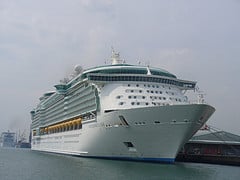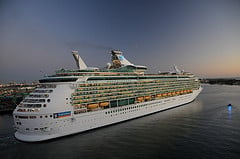Royal Caribbean selects Emsys Emissions Monitoring System for the Independence of the Seas
In:Royal Caribbean has awarded WR Systems the right to supply its Emsys (Emissions Monitoring System) to Royal Caribbean's Independence of the Seas ship.
 The Emsys system will monitor performance and provide emissions compliance data for an EcoSpec Exhaust Gas Cleaning System. This new tech will be installed sometime in mid-2011. This is a test program to see if it can be implemented fleet wide to reduce Royal Caribbean's environmental footprint.
The Emsys system will monitor performance and provide emissions compliance data for an EcoSpec Exhaust Gas Cleaning System. This new tech will be installed sometime in mid-2011. This is a test program to see if it can be implemented fleet wide to reduce Royal Caribbean's environmental footprint.
The Emsys system is based on solid-state Laser technology and has been awarded full Type Approval from the American Bureau of Shipping (ABS) in line with the International Maritime Organization's (IMO) MARPOL Annex VI NOx Regulations, and the IMO Exhaust Gas Cleaning System Guidelines. The system also carries the MED wheelmark.
The Emsys system is unique in that it includes the first sensor that can measure Particulate Matter that is "outside of the stack". This is important because it reduces the capital cost and eliminates the need to install sensitive measurement equipment in each of the monitored exhaust stacks. The integral Particulate Matter sensor has been developed to meet the requirements of the forthcoming US 'Emissions Control Area' (ECA) regulations, where Particulate Matter has been included in the regulatory language.
Royal Caribbean's Senior Vice President of Marine Operations, William S. Wright, chose Emsys because of its low maintenance and high accuracy capabilities, "It is important for RCL to demonstrate, with the highest accuracy and traceability, the emissions reduction performance of the EcoSpec emissions abatement system. As part of our on-going environmental commitment to reduce our air emissions, the Emsys system can provide the necessary data for both compliance purposes and our own internal technology evaluation criteria".


 A statement by the EPA claims the ban would stop 20 million gallons of sewage from entering California coastal waters.
A statement by the EPA claims the ban would stop 20 million gallons of sewage from entering California coastal waters. The CTEAC operates the program to recognize cruise lines that are committed to environmentally responsible operations, include the deployment of ships using reduced emission system technology or cleaner-burning fuel.
The CTEAC operates the program to recognize cruise lines that are committed to environmentally responsible operations, include the deployment of ships using reduced emission system technology or cleaner-burning fuel.